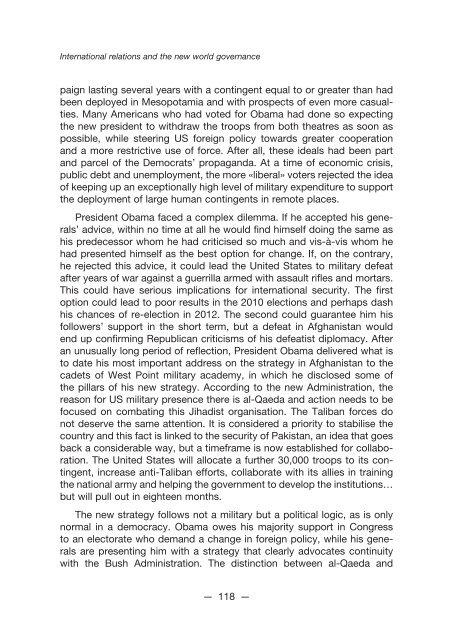Strategic Panorama 2009 - 2010 - IEEE
Strategic Panorama 2009 - 2010 - IEEE
Strategic Panorama 2009 - 2010 - IEEE
Create successful ePaper yourself
Turn your PDF publications into a flip-book with our unique Google optimized e-Paper software.
International relations and the new world governance<br />
paign lasting several years with a contingent equal to or greater than had<br />
been deployed in Mesopotamia and with prospects of even more casualties.<br />
Many Americans who had voted for Obama had done so expecting<br />
the new president to withdraw the troops from both theatres as soon as<br />
possible, while steering US foreign policy towards greater cooperation<br />
and a more restrictive use of force. After all, these ideals had been part<br />
and parcel of the Democrats’ propaganda. At a time of economic crisis,<br />
public debt and unemployment, the more «liberal» voters rejected the idea<br />
of keeping up an exceptionally high level of military expenditure to support<br />
the deployment of large human contingents in remote places.<br />
President Obama faced a complex dilemma. If he accepted his generals’<br />
advice, within no time at all he would find himself doing the same as<br />
his predecessor whom he had criticised so much and vis-à-vis whom he<br />
had presented himself as the best option for change. If, on the contrary,<br />
he rejected this advice, it could lead the United States to military defeat<br />
after years of war against a guerrilla armed with assault rifles and mortars.<br />
This could have serious implications for international security. The first<br />
option could lead to poor results in the <strong>2010</strong> elections and perhaps dash<br />
his chances of re-election in 2012. The second could guarantee him his<br />
followers’ support in the short term, but a defeat in Afghanistan would<br />
end up confirming Republican criticisms of his defeatist diplomacy. After<br />
an unusually long period of reflection, President Obama delivered what is<br />
to date his most important address on the strategy in Afghanistan to the<br />
cadets of West Point military academy, in which he disclosed some of<br />
the pillars of his new strategy. According to the new Administration, the<br />
reason for US military presence there is al-Qaeda and action needs to be<br />
focused on combating this Jihadist organisation. The Taliban forces do<br />
not deserve the same attention. It is considered a priority to stabilise the<br />
country and this fact is linked to the security of Pakistan, an idea that goes<br />
back a considerable way, but a timeframe is now established for collaboration.<br />
The United States will allocate a further 30,000 troops to its contingent,<br />
increase anti-Taliban efforts, collaborate with its allies in training<br />
the national army and helping the government to develop the institutions…<br />
but will pull out in eighteen months.<br />
The new strategy follows not a military but a political logic, as is only<br />
normal in a democracy. Obama owes his majority support in Congress<br />
to an electorate who demand a change in foreign policy, while his generals<br />
are presenting him with a strategy that clearly advocates continuity<br />
with the Bush Administration. The distinction between al-Qaeda and<br />
— 118 —

















